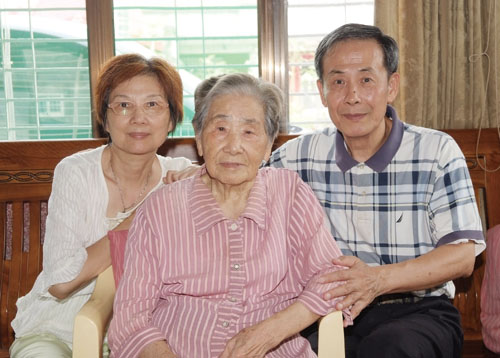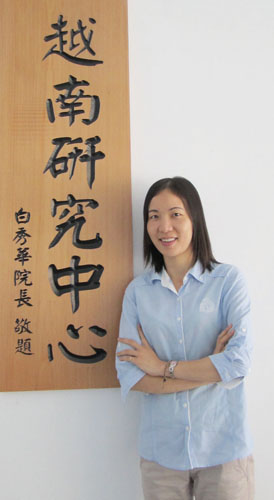Kao Shih-chien's commitment to Filial Piety/侍親至孝 高士謙
Kao Shih-chien's commitment to Filial Piety
◎English translation: Lin Fu-ju
◎Photos by Pao Chung-hui
"I want to thank God for allowing me to still be able to take care of my mother, even though I am in my sixties," states Kao Shih-chien, who was recently recognized by Kaohsiung City Government and the Ministry of Interior for his unwavering filial piety. Kao's father died before he was born and since he was raised by his mother, Kao Su-su, they have a particularly deep bond. After Kao Su-su's husband died, she remained single and worked on farms to earn a living.
After graduation, Kao and his wife decided they would work in a nearby town, allowing them to stay local in order to frequently visit his mother. More than forty years ago, his mother got high blood pressure and he made her his first priority. Kao admits it is his family that he values most and when he's not working, he spends all his time with his family.
Kao Shih-chien even retired early from his career as a teacher, so he could take better care of his 90-year-old mother. He now takes care of his mother twenty-four hours a day, seven days a week. His day starts with the cleaning of her dentures. He then helps her change, prepares her food and medications, takes her out for walks and for hospital checkups. He also does all the housework and wakes up two to three times, during the night to take care of his mother.
Kao's neighbors also admire his dedication to his mother. "Taking care of my mother is not hard. It's just tedious, but I see it as a sweet burden." Kao's wife and children also share his family values and help him take care of his mother. His children call their grandmother every day, even when they are at school or working in another city.
 When Kao Shih-chien received the Filial Piety Award, he was completely humbled. He stated he was just "an ordinary person", doing something that was very ordinary and simply his responsibility. He thanked his wife for her years of contribution and hoped society would be positively influenced by his story. He also hopes the government will continue to feature people that are committed to their filial duty.
When Kao Shih-chien received the Filial Piety Award, he was completely humbled. He stated he was just "an ordinary person", doing something that was very ordinary and simply his responsibility. He thanked his wife for her years of contribution and hoped society would be positively influenced by his story. He also hopes the government will continue to feature people that are committed to their filial duty.
侍親至孝 高士謙
◎文/林旻伶
◎攝影/鮑忠暉
「感謝老天爺,祂讓我照料母親,60多歲了還能與母親生活在一起,實在太好了!」今年獲得高雄市與內政部孝行楷模表揚的高士謙,言談間充滿對母親的關懷。
高士謙在出生前父親就已經過世,由務農的母親獨自拉拔長大,也因此與母親感情特別深厚。踏入社會後,為就近陪伴母親,高士謙放棄赴外地升遷的機會,與妻子一同在鄰近地區工作,尤其40多年前母親罹患高血壓後,他更將照顧母親放在第一順位,晨昏定省,從未一日間斷。對他而言,家庭就是生活的重心,工作以外的時間都保留給家人。
為了全心全意照顧高齡九十的母親,高士謙提早自教職退休,當起母親的全職看護。他的一天從為母親清洗假牙開始,接著要服侍換洗、準備飲食與藥品、攙扶母親外出散步、接送至醫院回診,生活起居大小事一手包辦,半夜還得起床2~3次照料母親,侍親至孝的態度看在鄰居眼中,莫不敬佩。他說:「照顧母親並不辛苦,只是瑣碎事情很多,對我來說,那是甜蜜的負擔。」凡事以親情為重的高家,不僅高士謙力行孝道,妻子也悉心照料婆婆,而五名子女即使在外地求學、工作,仍不忘每日打電話問候祖母。
對於此次獲得孝行獎表揚,高士謙謙虛地說:「平凡人做平凡事,照顧母親是他份內的工作。」他特別感謝妻子多年來的付出,同時他也希冀政府機關能夠持續挖掘更多孝行故事,讓這股正面能量感染予社會大眾。
高徐月香(左)、高蘇速(中間)和高士謙(右)
Kao Syu Yue-siang (left), Kao Su-su (center) and Kao Shih-chien (right)
Nguyen Thi My Huong Promotes Vietnamese Language & Culture
◎English translation: Peng Hsin-yi
◎Photos by Hou Ya-ting
Due to the recent trend of Taiwanese businesses investing in Vietnam, there has been an increase in demand for Vietnamese language and culture. In August 2012, the National University of Kaohsiung opened Taiwan's first Center for Vietnamese Studies. The center is headed up by Vietnamese native, Director Nguyen Tai My Huong. She hopes the program will give the Taiwanese insight into Vietnam's multi-faceted culture and language, serves as a bridge of understanding between the two countries and develop more partnerships. The center's language program is a collaborative project with the University of Social Sciences and Humanities, VHU Hanoi. Vietnamese proficiency tests issued by the Vietnamese Ministry of Education, and training are administered through the center and recognized internationally.
Moving to Taiwan in 2005, she attended graduate school at National Sun Yat-sen University, in the Department of Chinese Literature Studies. After graduation, she continued pursuing the PhD program and in her second year married her Taiwanese boyfriend. Now with a child and a career, she is at home in Taiwan. Ms. Nguyen hopes she can give back to the country she was born and raised and the country she now calls home.
Ms. Nguyen says, many of the Vietnamese women who have married into Taiwanese families come from economically deprived backgrounds and don't have the resources to provide their children with adequate education. Ms. Nguyen firmly believes in the power of knowledge and therefore provides free Chinese lessons for Vietnamese spouses at the center. It also provides basic Vietnamese classes for the children. The center is also looking for opportunities to collaborate with schools and government organizations.
 Ms. Nguyen never realized how much she appreciated Kaohsiung, until one day when she was on the 54th floor of the 85 Sky Tower. Looking out the window and saw a highly organized, vibrant, colorful city. It was at that moment she realized, Kaohsiung was a place of beauty, and she would give it her heart. One thing that does make her truly happy is spending time with her family. Her family is the source of her strength and allows her to get though any of life's challenges.
Ms. Nguyen never realized how much she appreciated Kaohsiung, until one day when she was on the 54th floor of the 85 Sky Tower. Looking out the window and saw a highly organized, vibrant, colorful city. It was at that moment she realized, Kaohsiung was a place of beauty, and she would give it her heart. One thing that does make her truly happy is spending time with her family. Her family is the source of her strength and allows her to get though any of life's challenges.
推動越語教育 阮氏美香
◎文、攝影/侯雅婷
隨著赴越南投資的台商人數日益增加,學習越語在台蔚成風潮。國立高雄大學於今(2012)年8月首開全台先例,成立「越南研究中心」,由越南籍阮氏美香擔任主任一職,從語言和文化面著手,希望介紹越南美麗而多元的完整面貌,進而推動台、越兩國交流更加順暢,而該中心更與獲得越南政府教育部授權的河內國家大學人文與社會科學大學合作,開設越語班提供社會人士進修管道,並承辦越南官方認證的越語檢定系統,檢定證書於全球都被認可。
因為喜愛中文,美香從2005年於高雄就讀中山大學中文研究所,接著攻讀中山大學博士學位,在博士班二年級時與台灣籍的先生結婚,經營幸福的三口之家,並持續深耕中文專業。在台灣,美香堪稱越南籍接受高等專業教育的代表之一,她希望能為滋養她的越南和台灣貢獻所長。
美香談起,有許多越南籍新移民受限於經濟狀況不佳與教育程度不足,嚴重影響了下一代的教育。越南研究中心考量教育能扭轉未來,因此中心以開設免費課程的方式,提供越南籍媽媽學習中文教育的機會,並規劃教導小朋友越語,希望引出孩子們的學習興趣。現階段,越南研究中心希望與學校或政府單位合作,該中心的老師會到有需求的學校教學。
美香笑著說起,她從沒察覺高雄的美麗,直到有天從高雄八五大樓的54樓一隅往下眺望,高雄市區規劃縝密的棋盤式街道,讓她大感驚豔,原來高雄這麼美!美香的幸福程式就是每天都一定要花時間與家人在一起,家庭快樂、幸福的能量,給予她面對挑戰時的勇氣。